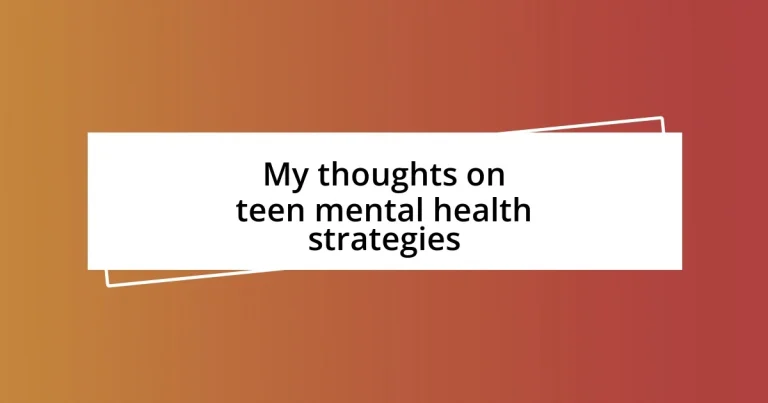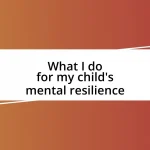Key takeaways:
- Understanding teen mental health is crucial, as teens face unique emotional challenges that can lead to isolation and deeper issues if not addressed.
- Implementing mental health strategies, such as mindfulness and open dialogue, promotes resilience and empowers teens to express their feelings, reducing loneliness.
- Building a supportive network involving friends, family, and professionals is essential for teens to navigate their emotional struggles and foster a sense of belonging.
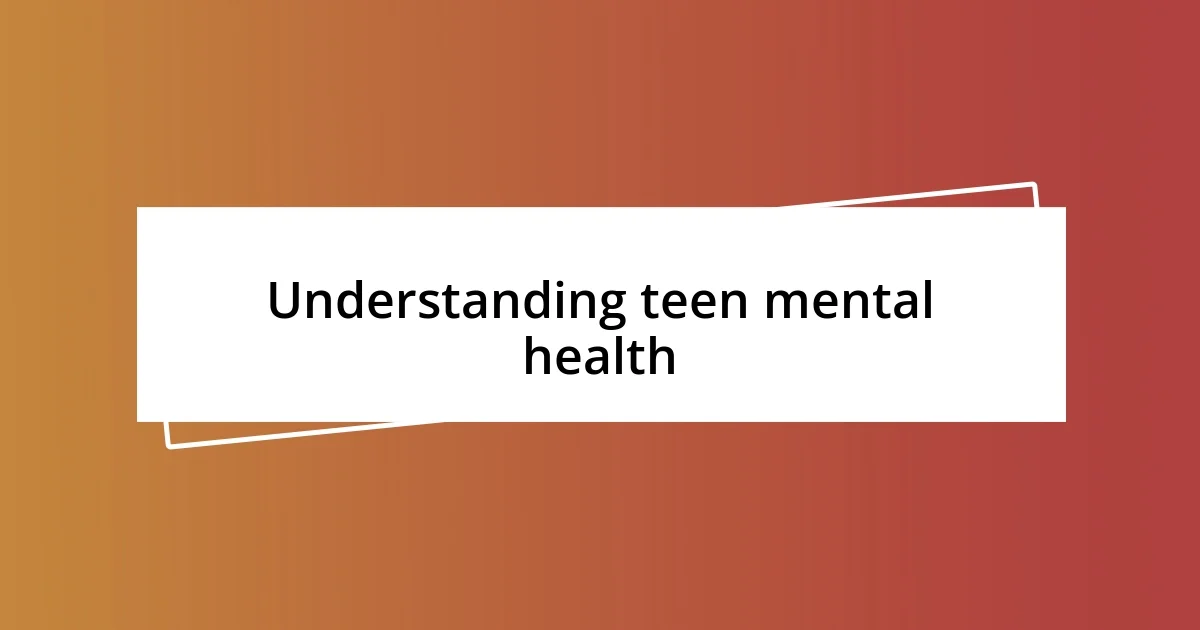
Understanding teen mental health
Navigating the teen years can feel like walking a tightrope, balancing academic pressures, social dynamics, and the onset of adulthood—all while grappling with a whirlwind of emotions. I vividly remember feeling overwhelmed by it all; one moment I’d be ecstatic about a friend’s invitation, and the next, I was crushed by self-doubt or anxiety about fitting in. Isn’t it fascinating how something as simple as a text message can elevate or devastate a teenager’s mood in seconds?
Teen mental health is often overlooked, as society tends to underestimate the intensity of these formative experiences. It’s not unusual for teens to feel isolated, even in a room full of friends. I encountered this firsthand during high school, where I found myself longing for genuine connections, yet battling the fear of vulnerability. Have you ever felt trapped in a crowd yet completely alone? That’s the kind of emotional turmoil that can lead to deeper mental health issues if left unaddressed.
Understanding that every teen experiences a unique concoction of societal, familial, and personal challenges is critical. I’ve seen peers struggle silently, masking their pain behind forced smiles. It makes me wonder: how often do we truly ask our teenagers how they’re feeling—not just in passing, but with genuine curiosity? Let’s not forget that acknowledging their struggles is the first step in supporting them on their journey to mental wellness.
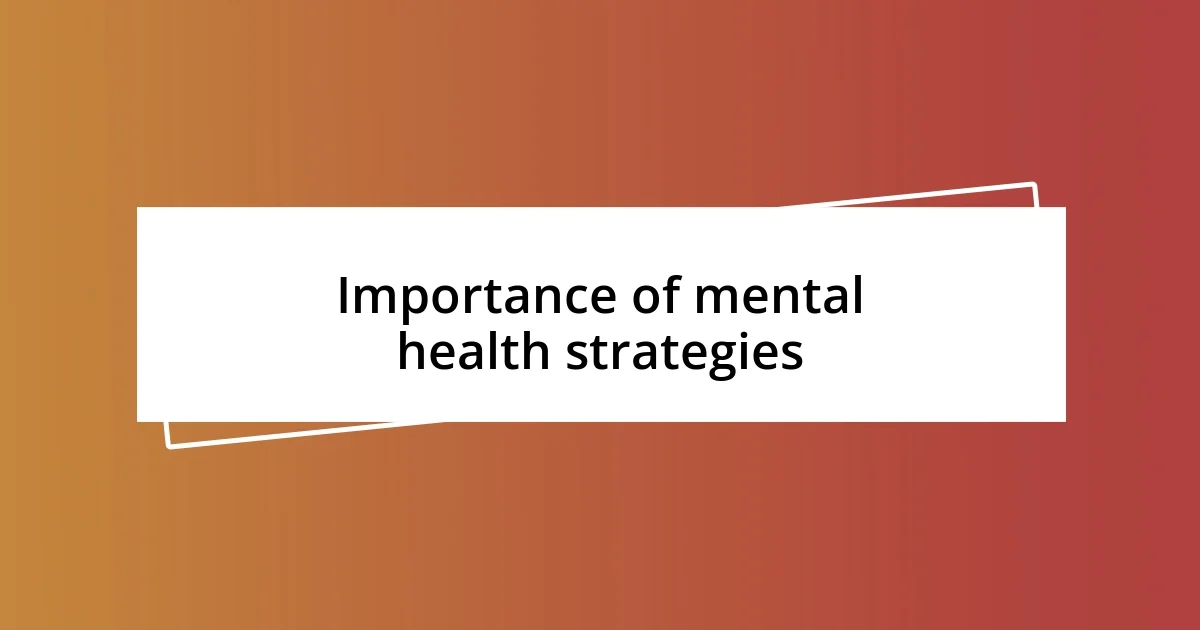
Importance of mental health strategies
Mental health strategies are vital because they provide teens with tools to navigate challenging emotions and pressures. I remember when a simple breathing exercise helped me calm my nerves before a big presentation. Having strategies in place can be a game-changer, allowing teens to manage their stress rather than feeling overwhelmed by it.
Beyond coping techniques, mental health strategies foster resilience. I once participated in a group that focused on mindfulness practices, and it was incredible to see how sharing experiences and learning to be present transformed the dynamics among us. Teens need opportunities to cultivate emotional strength, and structured strategies offer a supportive framework for doing just that.
Moreover, incorporating mental health strategies promotes open dialogue about emotional well-being. I often think about how important it was for me to have a supportive adult who listened to my concerns without judgment. These strategies empower teens to articulate their feelings, enabling understanding and connection, something that can significantly reduce feelings of isolation and loneliness.
| Benefits of Mental Health Strategies | Personal Experience |
|---|---|
| Stress Management | Breathing exercises calmed my nerves before presentations. |
| Resilience Building | Mindfulness practices transformed group dynamics for us. |
| Open Dialogue | A supportive adult helped me express my feelings without judgment. |

Common mental health challenges
Common mental health challenges can vary significantly among teens, but some issues tend to surface more frequently. Personally, I’ve encountered friends dealing with anxiety that often stemmed from academic pressures, making it incredibly tough to focus on anything else. I remember a close friend of mine who would spend hours worrying about grades, which impacted her sleep and overall well-being. Recognizing these prevalent issues is crucial for fostering an environment where teens can thrive emotionally.
Here’s a list of common mental health challenges that teens often face:
- Anxiety Disorders: Many teens experience excessive worrying that can interfere with daily life.
- Depression: Feelings of hopelessness and sadness can lead to withdrawal from activities they once enjoyed.
- Body Image Issues: Society places immense pressure on appearance, leading to low self-esteem and eating disorders.
- Substance Abuse: Some teens may turn to drugs or alcohol as a way to cope with their feelings.
- Social Isolation: The fear of not fitting in can make some teens feel alone, even when surrounded by peers.
It’s essential to understand that these challenges are not just phases; they can have lasting impacts. I can recall feeling a deep sadness myself at times, which lingered longer than I’d like to admit. It’s like navigating through fog—you want to find your way, but everything feels obscured. We must acknowledge and address these issues early on to support our teens effectively.
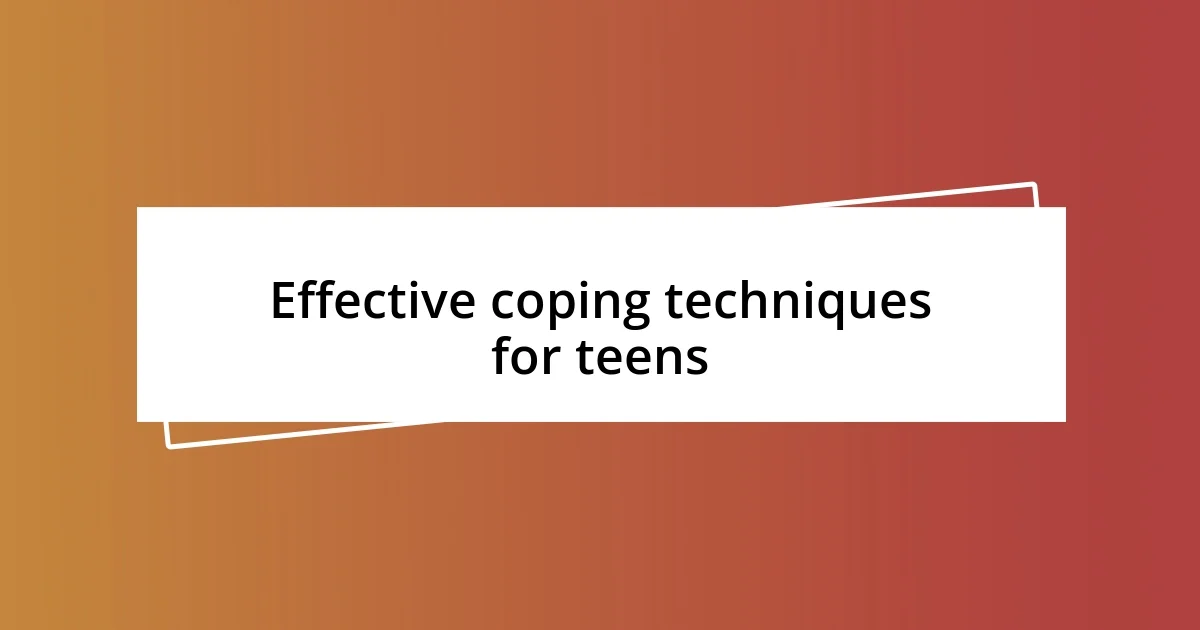
Effective coping techniques for teens
One effective coping technique I’ve found is journaling. Writing down my feelings not only helped me process what was going on but also served as a release valve for pent-up emotions. I remember the first time I poured my heart out onto the page, it felt like lifting a weight off my shoulders. Have you ever tried capturing your thoughts in written form? It can be incredibly cathartic.
Mindfulness is another invaluable tool. I’ve often used simple meditation sessions to center myself after a hectic day. Just a few minutes focusing on my breath has a way of grounding me. It’s fascinating how such a brief pause can shift my perspective and help me regain clarity. I wonder if teens realize the power of these moments of stillness in their often chaotic lives?
Physical activity cannot be overlooked as a coping strategy. Whether it’s a short walk or an intense workout, moving my body always elevates my mood. I recall times when I’d lace up my shoes and step out for a run; it became my sanctuary. The rush of endorphins taught me that sometimes, getting out and engaging with the world is exactly what I need to combat anxiety and sadness. Have you experienced that moment when physical activity not only invigorates you but also clears your mind?
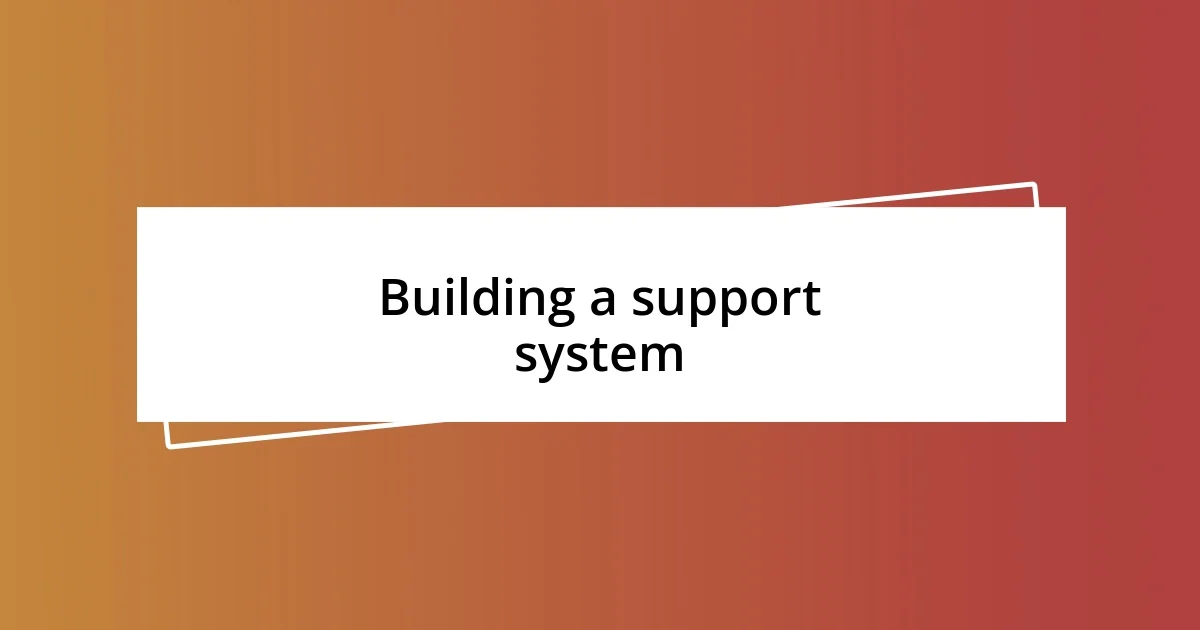
Building a support system
Building a support system is a game-changer for teens navigating the complexities of mental health. I remember during my high school years, I found immense comfort in my circle of friends who truly understood what I was going through. We became each other’s safe havens, sharing our challenges and triumphs openly, and that connection was vital in moments of stress. Have you ever experienced that feeling of belonging when you’re surrounded by people who genuinely care?
Family also plays a crucial role in this support system. I distinctly recall the late-night conversations with my parents, where they lent an empathetic ear to my worries. Their understanding helped me feel less alone during tough times. It’s essential for parents to create an atmosphere of trust, where their teens feel comfortable sharing their feelings without fear of judgment. Isn’t it amazing how having just one supportive person can dramatically shift your perspective?
Additionally, I think that seeking professional help is key in constructing your support network. Not only can therapists provide coping strategies, but sharing your thoughts with someone trained can carry an extra layer of validation. I once hesitated to speak to a counselor, thinking I could handle everything myself. But once I took that step, I found a new clarity that transformed my approach to stress. Have you ever thought about how professional support could elevate your coping strategies? It truly can make a world of difference.
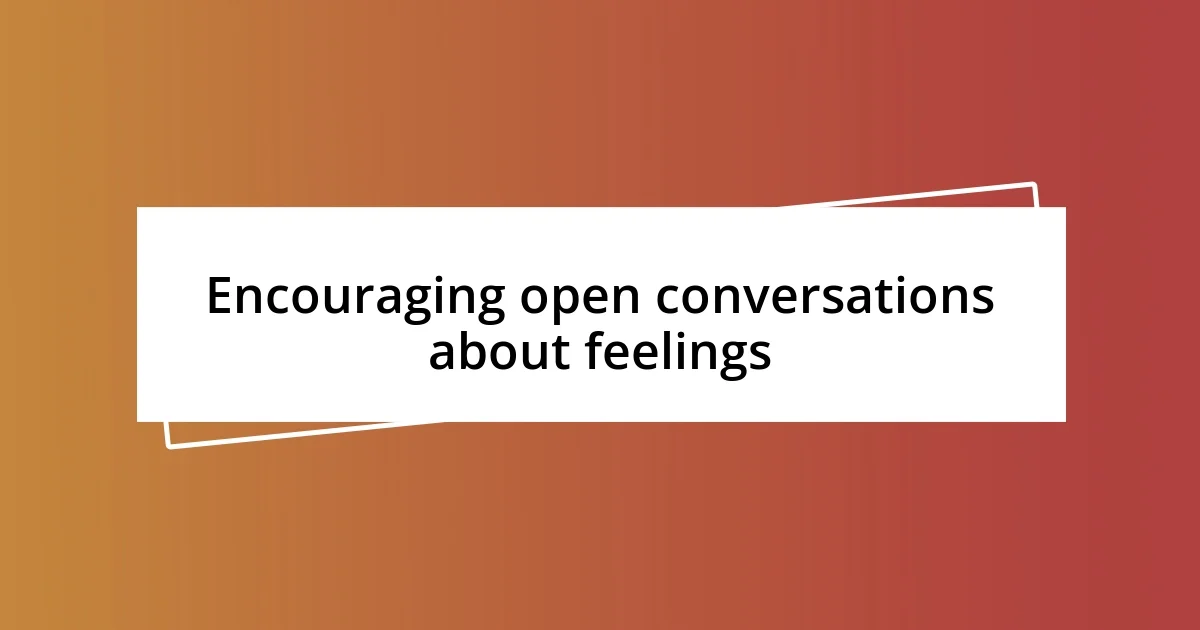
Encouraging open conversations about feelings
Encouraging open conversations about feelings can truly change how teens navigate their emotional worlds. I remember a time in high school when my best friend bravely opened up about her struggles with anxiety. That moment sparked something incredible; it made me realize that sharing my own feelings wasn’t just acceptable—it was necessary. Have you ever felt that relief when someone else spoke the words you’ve been holding inside?
Creating a comfortable space for these conversations is essential, too. I’ve found that casual settings, like a coffee shop or a quiet park, tend to foster more honest exchanges. When the environment feels relaxed, it encourages openness. I still think back to those afternoons spent chatting with friends, where the conversation flowed effortlessly, and we could talk about everything from stress to future hopes without judgment. Isn’t it liberating to express yourself in a safe space?
As we encourage these discussions, it’s vital to listen actively and with empathy. I’ve learned that sometimes, just being silent and present while someone pours out their feelings can be more impactful than trying to solve their problems. I recall a moment when a friend vented about a tough breakup and all I did was listen. At the end of it, she hugged me and said that being heard made everything a little lighter. Have you experienced the healing power of just listening, or being listened to? It’s profound how validating it can be.












